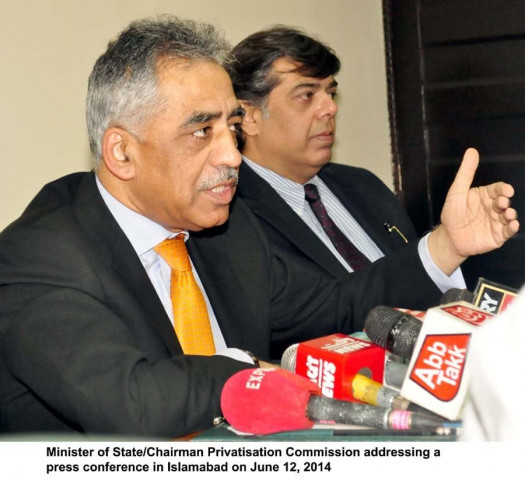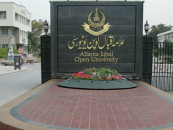Pakistan to raise $387 m by selling UBL
Pakistan hopes to raise up to $5 billion in privatisation revenue in the next two years, says PC chairperson.

Chairman Privatisation Commission Muhammad Zubair addressing a press conference in Islamabad on June 12, 2014. PHOTO: PID
“The cabinet committee on privatisation has approved the sale at 9:20 am and it will increase foreign reserves by $311 million,” said Finance Minister Ishaq Dar while addressing the National Assembly.
He appraised the house that the sale of 19.8 percent stakes in UBL would raise Rs38 billion or $387 million.
He said that the privatisation was approved by Council of Common Interests (CCI) and in the first phase 31 institutions were identified. The Lakhra Power Plant was added later on, he added.
The minister said that 51 percent shares of the UBL were sold in 2002.
Dar further said that the sale of remaining UBL shares would also help increase the foreign reserves of the country. “Our foreign reserves would cross $14 billion by June 30,” he added.
Talking more about the foreign reserves, the finance minister said that they stood at $13.52 billion till last night - $8.60 billion with the State Bank of Pakistan and $4.90 billion with commercial banks.
Though taking the floor to make a policy statement, leader of the opposition in the National Assembly Syed Khursheed Ahmed Shah raised objections to Dar, saying “the government was setting a wrong example by eulogising its achievements at a time when the house was in the middle of budget debate.”
He asked the finance minister to make such announcements at the end of the budget debate when he would be given an opportunity to make concluding remarks.
The opposition leader’s views were endorsed by Pakistan Tehreek-e-Insaaf (PTI) leader Shah Mehmood Qureshi.
The deal is part of the government’s initiative to privatise 68 public companies, including 10 banks, that was announced earlier this year.
The government sees the sell-off as a life saver for the country’s struggling economy, crippled by power shortages, corruption and militant violence.
Successful privatisation is Prime Minister Nawaz Sharif’s top political and economic goal. “The first transaction under the privatisation commission has been overwhelmingly successful and with it Pakistan has re-entered the world equity market after eight long years,” Privatisation Commission Chairman Mohammad Zubair told Reuters.
Foreign buyers including Morgan Stanley, Wellington, Templeton and others bought 82 percent of the stake, he said. Pakistan hopes to raise up to $5 billion in privatisation revenue in the next two years to ease pressure on strained public finances, Zubair added.
Observers fear that an assault on Sunday on Jinnah International Airport in Karachi would hamper efforts to attract foreign investors to revive economic growth.
“This active participation in United Bank’s privatisation by the world’s leading equity funds is a reflection of Pakistan’s extremely positive economic situation as perceived by these investors despite Sunday night’s terror attacks in Karachi,” Zubair said.
The International Monetary Fund saved Pakistan from possible default by agreeing last September to lend it $6.7 billion over three years, making the loan conditional on economic reforms such as a longstanding promise to privatise loss-making state companies.



















COMMENTS
Comments are moderated and generally will be posted if they are on-topic and not abusive.
For more information, please see our Comments FAQ